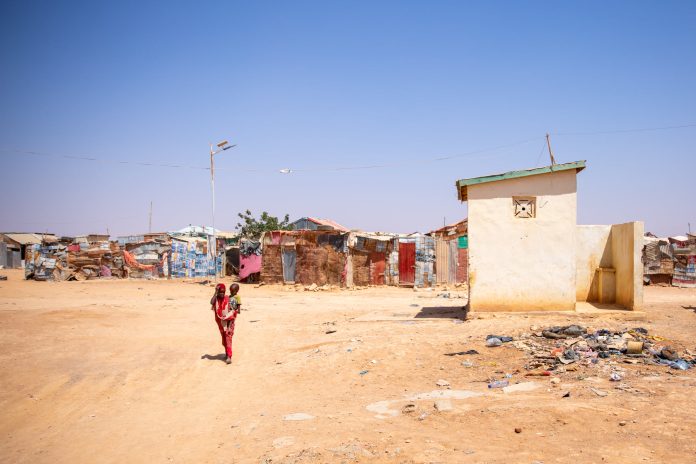MOGADISHU (KAAB TV) – The city of Baidoa earned the nickname the ‘city of death’ because so many people died here during the famine and civil war in the early 1990s. People still die here.
A quarter of all people in Somalia are now displaced by drought and conflict, Islamic Relief says based on the latest official data, as the country’s displacement crisis hits record levels.
More than 4.3 million* people are now internally displaced within Somalia – the highest figure ever recorded in the country, which has a population of around 17 million.
The city of Baidoa, in the southwest Bay region, is one of the main centres of the displacement crisis. Vast camps encircle the city and stretch for miles. Officially there are 740,065 people but aid workers believe the numbers could be even higher because many of the camps are unverified and unrecorded.
Farhan Abdirizak Adan, an Islamic Relief project officer in Baidoa, says:
“The city of Baidoa earned the nickname the ‘city of death’ because so many people died here during the famine and civil war in the early 1990s. People still die here. There is so much malnutrition as there is not enough food to go around. I see young men and women in their twenties who look like they’re still children because they have so little food to eat. There are women and even school-age girls who are forced to sell their bodies for sex just so they can afford to eat that night.
“Most people are here because of the terrible drought in Somalia which has killed people, livestock and crops, increased food prices and driven many people into destitution. They have no alternative but to flee their homes and seek help at aid camps. Others have fled the ongoing conflict. I see so many women in the camps wearing white headscarves which signifies that their husbands have died from war or hunger.
“The situation here is beyond imagination and more people arrive every day. It’s sad seeing people travel here in the hope of receiving aid but there’s not enough so they have to wait weeks to start getting food. People have lost loved ones to hunger in that time. Without aid many more people would be dying of hunger, but humanitarian agencies are short of funds and we can’t help everyone.”
As many as 43,000 people are estimated to have died in the drought in Somalia last year with half of the deaths children under five years old. Half of Somalia’s population of 17 million is facing food insecurity and close to 1.8 million children are suffering from malnutrition.
Aamina**, a 65-year-old mother of four, lives in one of the camps on the outskirts of Baidoa, where thousands of people live in rows of makeshift tents covered with tarpaulin or whatever materials they can find.
She says: “We travelled 225kms to get here. We had no choice but to leave our home as armed groups tried to forcibly recruit my eldest son. We didn’t feel safe so we had to flee. Life is difficult here in the camp but if we left we’d be completely destitute and have nothing at all. Here we have just enough to survive, but I worry my children don’t get enough to eat to be healthy, and there are no job prospects here for anyone. We are alive but it’s difficult to have hope for the future.”
The price of the staple food Sorghum has doubled in the past month, from $0.7 per Kg to $1.5 per Kg, after armed groups blockaded Baidoa and restricted the flow of supplies. Although the blockade has now been lifted prices have remained high and less affordable to most displaced families.
Islamic Relief is calling for sustained international support to address Somalia’s internal displacement crisis – including funding for the country’s Humanitarian Response Plan, which is currently just 33% funded, and a long-term approach to support displaced families with new livelihoods and job opportunities.
Islamic Relief works in locations across Somalia including Mogadishu, Baidoa, Dinsor, Garowe, Hargeisa, and others. It supports 70 IDP camps in Baidoa providing residents with food, cash support and water so they can meet their basic needs. It also works in some of the unofficial unverified camps.
Outside of the country’s IDP camps Islamic Relief supports farmers who have been impacted by the three year drought, brings water and sanitation to communities, and has a programme to care for orphans until they turn eighteen or finish their education.
–
**Name changed to protect identity


